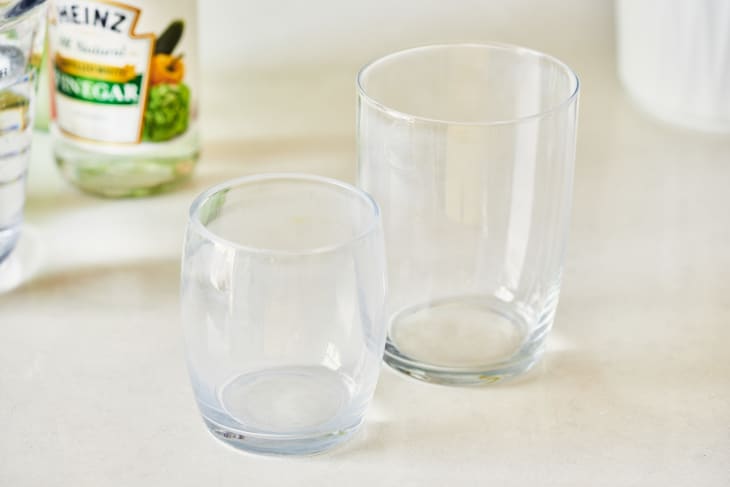6 Things to Consider If Your Drinking Glasses Seriously Won’t Get Clean

Reaching into the cabinet and pulling out a less than sparkling drinking glass is a real bummer — especially when you think you’ve already gone to the work of washing it. But you don’t need body builder-level muscles to scrub off all the grossness. Here, two cleaning experts offer their tips for making your glassware crystal clear, even if it’s been a while since it shimmered. Spoiler alert: You’re going to want to add a gallon of white vinegar to your next shopping list.
Your dishwasher needs to be cleaned, too.
If your glasses come out of the dishwasher covered in teeny-tiny flecks of food, the appliance itself could be the culprit. Its filter needs to be cleaned once a month, says Val Oliveira, owner of Val’s Services Cleaning in Chicago.
You’ll find the filter on the floor of the dishwasher, but it could be in pretty much any location there depending on the model. Unscrew and soak it for 30 minutes in a solution of half a cup of vinegar and half a cup of hot water. After the soak, scrub the filter with detergent. “You’re going to see the water is all dirty black,” Oliveira says. “Sometimes food is there. If you have a pet, you’ll even find hair.”
But let’s say you’ve never done this (raises hand) and you’ve already got debris fused to your glasses. Becky Rapinchuk of the blog Clean Mama says to just give them a soak in warm water with a little dish soap, scrub, and then run through the dishwasher again, if needed.
If you can’t rinse them immediately, you should soak your morning smoothie glasses while you’re out.
The ease of making a smoothie for breakfast is inversely proportional to the difficulty of getting seeds and pulp out of the bottom of a glass if you don’t deal with the mess right away. The best approach is to rinse these glasses ASAP and wipe the insides with a sponge. But when you’re rushing out of the house and can’t deal with it until evening, fill the glasses with hot water and a little soap until you can get to it.
If the residue has already dried or gone through the dishwasher, Rapinchuk recommends filling the glasses with hot water and letting them sit just until the debris breaks down, then washing the glasses as usual.
Lipstick marks are more than just a cosmetic issue (no pun intended).
Lipstick (or any smudge from a person) on the rim of glasses means germs are still hanging out too. The simplest way to remove the waxy residue is to wipe the rims with a few drops of detergent on a sponge before washing the glasses, Oliveira says.
If the marks are stubborn or you’re handwashing and really want to make sure a glass is disinfected, fill a bowl with super hot water (“If you put your hand in, you’d think, ‘Oh my gosh, I’m burning,’” Oliveira says) and one cup of vinegar. Soak for 10 to 20 minutes, and wipe the smudges with a paper towel.
Water spots are worse when you have hard water.
Water spots are a result of mineral deposits. Hard water = more minerals. Once again, white vinegar is your secret weapon, Rapinchuk says. With a dishwasher, you can prevent the spots from forming by adding a little bit to the rinse aid compartment. If you notice spots after handwashing, put vinegar on a dishcloth, wipe the marks, and then rewash the glasses with soap and water before drying with a flour sack cloth for a lint-free finish.
You need to wash glasses even when you haven’t used them in a while.
Glasses get a foggy, cloudy appearance from a combination of settling dust and grease. “I always make fun of horror movies,” Oliveira says. “The glasses look so sad because they haven’t been washed.”
Every two months, remove every glass from your cabinet — including and especially glasses for fancier occasions that you might not use frequently — and take an afternoon to deep clean. Rapinchuk recommends swirling a tablespoon of vinegar in each glass before handwashing with hot, soapy water or running through the dishwasher.
Slippery, slimy-feeling glasses mean you’re using too much detergent.
“A lot of people think the more soap, the more clean,” Oliveira says. But when you’re handwashing, you actually only need a few drops on the sponge.
You’ve already gone way overboard? Spray the glass with a little — you guessed it — white vinegar, which will break down the detergent and help it rinse off.
Correction: An earlier version of this post misspelled Oliveira’s name and business name. We’ve updated them to be accurate.